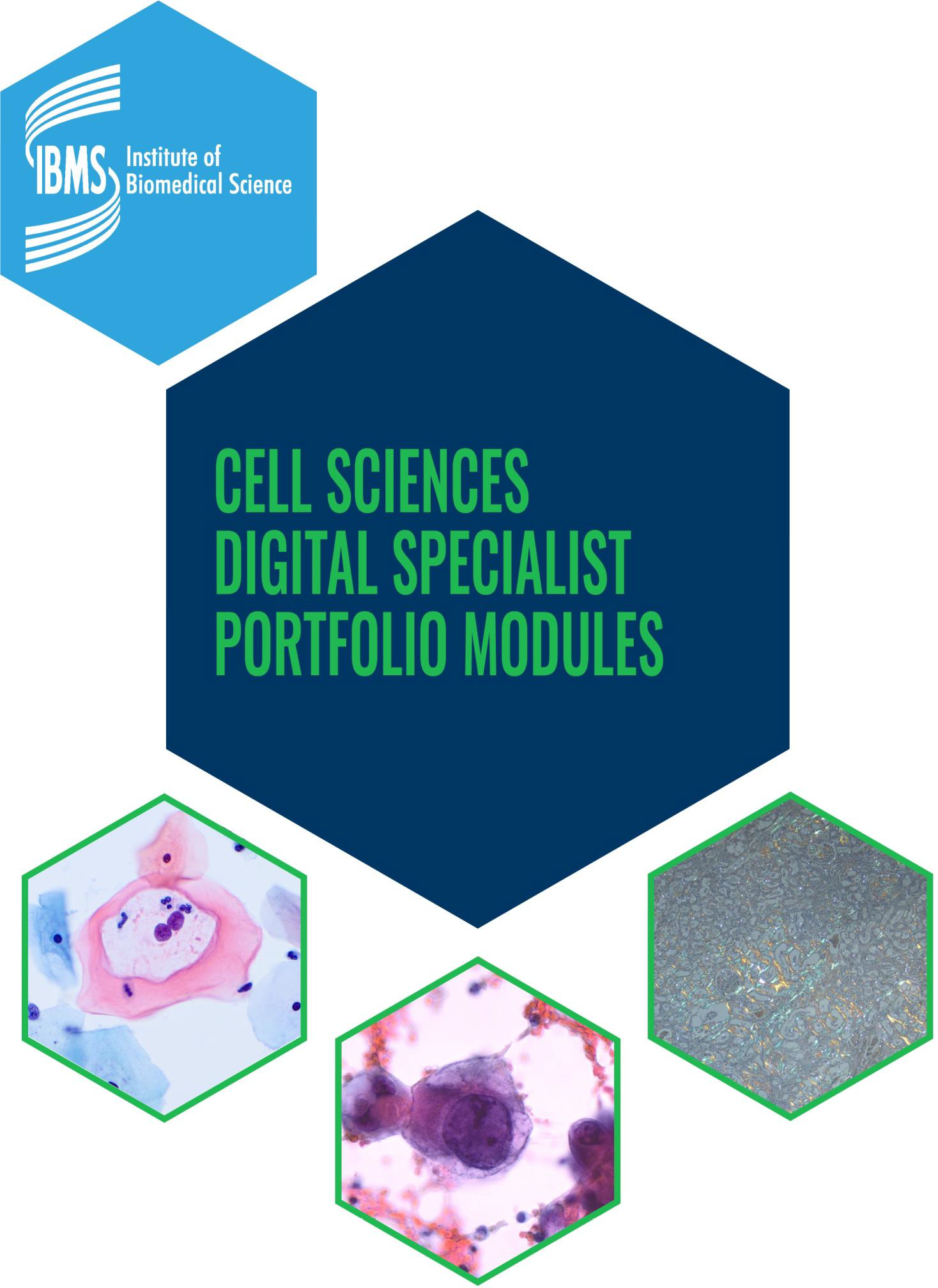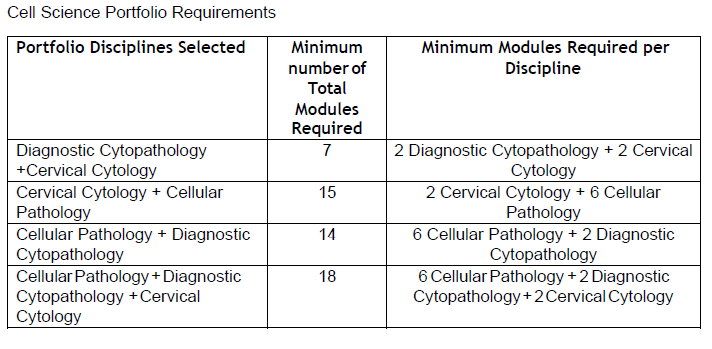The IBMS single or multidisciplinary specialist portfolio – which one works for you?
Tracey Stevenson, Consultant Biomedical Scientist, Royal Devon University Hospital and Chair of the IBMS Cytopathology Specialist Advisory Panel

Following transfer of my departments’ cervical screening services in March 2020 to one of the 8 hub labs and the creation of our new diagnostic cytology section, I decided this was as good a time as any to involve myself in the IBMS Cytopathology Specialist Advisory Panel (SAP). Previously it was too difficult to spare the time as it involved trips to London for meetings but following lockdown and the acceptance of virtual meetings via Teams or Zoom and the reduction of 90,000 samples it seemed the perfect time to join.
So as part of the IBMS SAP team at this time it became apparent that we needed to separate out the cytology specialist portfolio, one for staff carrying out diagnostic cytology only and one for staff working within the large cervical cytology centres. Due to centralisation of the NHS cervical screening service, apart from redundancy, many cytology staff had been absorbed into histology, andrology, molecular or one of the other pathology disciplines, with very few standalone diagnostic cytology labs remaining. We needed to be mindful of the staff working in the cervical screening hubs who still wanted the opportunity to undertake diagnostic cytology to specialist level. This was also true for staff working in histology who had taken on cytology roles, such as rapid on-site assessment (ROSE).
During the review of the original cytology specialist portfolio it became apparent that both new portfolios also required updating. So, following various discussions and draft versions the IBMS Cytology SAP relaunched the cytology Specialist Portfolios in September 2020 to better reflect the more focused services provided by laboratories. The changes also reflected the increasing role molecular based techniques were playing across pathology as a whole and increasingly so within cytology.
I must admit looking back at the newly created diagnostic cytopathology portfolio it seems we were rather overzealous with the addition of the molecular sections and the clinic sections. For those of you who completed that portfolio – Well Done and Sorry!
Initial conversations with SAP panel members around the specialist portfolio review had originally started in 2019, but Covid had put paid to these conversations. It was not until the appointment of Donna Torrance as the IBMS Head of Learning and Development in 2022 that we once again revisited the specialist portfolios with the aim of creating a modular format to provide more flexibility for candidates as well as laboratories. Luckily the Cytology SAP had already done most of the review work when we split the portfolios and we really only needed to create the modules – or so we thought. The revamp included removing knowledge and competency sections which we were all really familiar with and creating 7-10 Learning outcomes with an added indicative content section.
However, we persevered and the modular diagnostic cytology specialist portfolio and the cervical cytology portfolio were launched in April and August 2024 respectively.
As a result of this and the release of the other discipline specific specialist portfolios over the course of 2024 the multidisciplinary portfolio became a reality. Originally the discussion was around full flexibility of the modules to create a specialist level portfolio but it soon became apparent that this would be almost impossible to assess in practice and only a few small laboratories were felt to still be truly multidisciplinary. The creation of the Cell Sciences, Blood Sciences and Infection Sciences Specialist Portfolios was then realised and released in November 2024.

For Cell Sciences this includes cervical, diagnostic cytology and histology. There are minimum numbers of modules required for each combination with many of the modules having co-requisites (modules that must be completed together). The aim is that the lab and candidate will decide on what works best for them. The specialist portfolio obtained will be in Cell Sciences with the modules undertaken listed on the certificate.

There is also now the Andrology Specialist portfolio and the Genomics and Molecular Pathology Specialist portfolio. Staff wishing to select additional optional modules from these two new Specialist Portfolios can do so using the application form when applying for the Cell Sciences multidisciplinary portfolio. It should be noted however that for all multidisciplinary modules selected the module must be practically completed to a competent level as part of the training plan. All specialist portfolios also now include a mandatory quality module.
Following discussions with the BAC and their creation of a comprehensive training programme, a ROSE portfolio was also implemented and the modular version released this month (April). Although this is a post specialist portfolio certificate and not a Specialist Portfolio in its own right.
The modular single discipline and the multi-disciplinary specialist portfolios continue to have the same requirements for staff undertaking them. Staff need to be an IBMS Licentiate with an assigned training officer and the lab holding approval to train. Each module requires 2 pieces of evidence and personal reflection. The assessment can be virtual or on-site and involves a lab tour and a presentation.
Although these multi-discipline Specialist portfolios may bring great benefit to your department as they can be tailored to your departments needs’ they will also bring a few challenges.
Not only will your lab still need to hold IBMS approval to train for specialist level, but in order to apply for a multi-discipline portfolio your lab will need multi-disciplinary training approval.
You will also need to consider who will sign off as competent those sections which are possibly not the core tasks in your department. Who will advise and mentor staff in the completion of these modules if the training officer is not the person experienced in these areas.
The next step is providing all of the existing modules as CPD for staff to be able to add these as they take on extra roles within the lab or move to other labs and likewise for laboratories to be able to request staff undertake these when needed to help to provide the flexibility labs require now and in the future.
We needed to get this part right as these are the stepping stones for staff to their reporting, dissection or senior manager roles via the Higher Specialist Diploma (HSD), the Diploma of Expert Practice (DEP) or the Advanced Specialist Diploma (ASD).
I believe that these changes are important as they will not only help to retain the staff with cytology experience currently in our labs but hopefully encourage those wishing to join the profession that there is still a flexible career pathway for cytology either in a single discipline or within a Cell Sciences multidisciplinary role.
Image and table taken from ‘IBMS Digital Specialist Portfolio Cell Sciences Modules’ with permission from the IBMS.
